2013
The Casual Sportsman
Boot Your Punter?

How do you win 124 games, lose 22, and win three state football championships in ten years?
Never punt
Always on-side kick
It sounds crazy, but that’s how the Pulaski Academy Bruins in Arkansas did it. Though maybe crazy like a fox. The results speak for themselves.
University of California economics professor David Romer studied over 2,000 football games and determined those two things would work. His main thesis, and a football truism, games are decided by turnovers. Punts and kick-offs are effectively voluntary turnovers exchanged for field position. Yet the numbers show field position is less advantageous than supposed.
Bruins coach Kevin Kelley puts professor Romer’s theory into practice. Here’s a link to an article with a video explaining it.
This strategy might not work so well in the NFL which has much better punters and kickers so the field position difference will be greater. Still, I wonder…
Filed 12/19/13
The Exception Proves the Rule Again

I present a correction for one of the first entries ever on terrycolon.com for the derivation of “The exception proves the rule.” I’ll not rehash the error, but give the true etymology as follows.
The confusion comes from the word exception, rather than the word prove as I had it before. Exception can mean ‘something unusual, not following a rule.’ What it means in the case of the phrase is omitting or ignoring. As in, “I’ll make an exception in this case.”
So, if we come across some sign reading, “Closed Sunday”, we can infer the rule, “Open Monday through Saturday.” The exception on Sunday demonstrates, or proves, the rule for every other day exists even though the every day rule isn’t stated.
This derives from a legal maxim established in English law in the early 17th century. Written, as customary then, in Latin: Exceptio probat regulam in casibus non exceptis. In English that’s “Exception confirms the rule in the cases not excepted.”
So now you really know. We Regret the Error. All the same, you can assume I think the rest of the site is okay. The exception proves the rule.
Filed 11/18/13
The Great Medical Staff Mixup
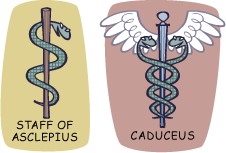
Looking at the two similar ancient symbols above it’s easy to imagine how one might get them mixed up. Such confusion arose around the 1850s where the Caduceus was mistaken for the Staff of Asclepius and so the Caduceus became the symbol for medicine. Fortunately, sick folks today don’t know what the Caduceus originally stood for or they might not go to any doctor or hospital using it.
The Staff of Asclepius was the symbol for the Roman god of medicine and healing. How a serpent on a stick means medicine beats me. I suppose the ancient Romans got it, but there aren’t any ancient Romans around today to explain it.
The Caduceus was the symbol of Mercury, the Roman god of liars and thieves. Mercury also gives us the word mercurial, meaning “changeable; volatile; fickle; flighty; erratic. Fast-talking and likely to do the unexpected.” Not exactly traits we look for in medical folks. And when they tell you if you like your health insurance you can keep it… now you know.
Filed 11/21/13
What is Eke Without Out?

Another word that seems to only exist in conjunction with another word, or as part of a phrase is eke. Does anybody say eke without adding out? As in, “eke out a living.”
Eke comes from an old verb meaning to add, supplement, or grow. The word is pretty much gone except when we eke out a living, victory or whatever. Which doesn’t so much mean add as barely make it by the skin of your teeth.
Eke does live on elsewhere incognito, as it were. Folks in days gone by were sometimes called by something other than their given name, which they called an eke-name, an additional name. Over time the N in the article got switched to the noun. So an eke-name became a neke-name, or as we say today, a nickname.
Filed 11/17/13
Black & White Gray Squirrels All Over
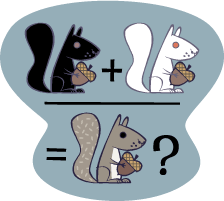
If you live in my neck of the woods, southeastern Michigan, you’ve likely run across black squirrels. While I don’t actually live in the woods, it’s woodsy enough for tree squirrels to be happy as clams living hereabouts. Clams, not so much. These black squirrels are melanistic gray squirrels. Specifically, eastern gray squirrels – a type, rather than a color, of squirrel like red squirrels, fox squirrels, and flying squirrels.
In some places you’ll come across white squirrels which may be albino gray squirrels or not, depending. At any rate, these not-so-gray gray squirrels are not unique to any one place. There are black squirrels in the UK, for instance. These British black squirrels are American gray squirrel interlopers.
Now then, what do you get if you cross a black gray squirrel with a white gray squirrel?
Filed 10/30/13
Why Authors Wright Plays Instead of Writing Them

Some words aren’t spelled as we might expect because the derivation isn’t what we might expect. Here’s a couple:
straitjacket
playwright
The strait in straitjacket doesn’t come from meaning something flat without curves or bends. Strait, no GH, is an old word nobody uses any more meaning tight, snug, restricting. So a straitjacket is a tight, restricting jacket, and not an flat, non-curved jacket.
This explains the spelling of “on the strait and narrow,” and straitlaced. As is why a narrow waterway between two larger bodies of water is called a strait and not a straight. A strait doesn’t have to be straight.
A screenwriter writes for the screen, movies or TV. The spelling reflects that, screen + writer. However it’s not a playwriter, or even a playwrite, but a playwright, play + wright with a GH and no E at the end. What gives?
Wright has nothing to do with write. Wright means builder or maker. As in boatwright, a boat builder; cartwright a cart maker; wainwright, a wagon maker. So a playwright is a play builder or maker. That’s right, a playwright both wrights and writes a play. Still, a lot of what happens on stage isn’t written but is done by the director and actors. Though within the framework built by the playwright.
To add a little confusion, we have copywriter and copyright which are two different things altogether, though related. You can copyright a play, but you can’t playright it. Past tense of copyright is copyrighted, not copywritten. So get it straight, alright?
Filed 10/25/13
Hooray for Hollywar!

A Baker’s Dozen Things I Learned From World War II Movies
- Machine-gunners aim at your feet, at least that’s where the bullets hit.
- A knife in the back instantly kills the enemy. A hail of bullets will only wound one of your own.
- Vehicles explode in fireballs when hit by small arms fire.
- Battles are won by breaking the rules, or disobeying orders.
- Enemy grenades have a long delay fuse so you can toss them back.
- Scruffiness is protective. The neater the soldier the more likely they are to die.
- Sergeants are smarter than lieutenants. Captains are smarter than lieutenants. Privates are smarter than lieutenants. Heck, everybody is smarter than lieutenants.
- Germans were automatons, or vicious Nazis.
- Every Frenchman was in the underground.
- The British liked doing things the hard way.
- Japanese liked dying.
- Italians fought the war as a sort-of joke.
- Every American unit had one guy from Brooklyn.
OK, I admit this bit is maybe 25 years out of date. Another thing out of date: a baker’s dozen. Have you ever seen a package of 13 baked anything?
Filed 10/14/13
When NASA Ain’t Rocket Science

In 2005 NASA sent the spacecraft Deep Impact to study comet Tempel 1 up close. While there were many surprises for the Deep Impact team, a bonus surprise was the explanation for one of the surprises.
A probe fired from Deep Impact blasted a hole so scientists could see inside the comet. The impact crater was much smaller than anticipated. NASA scientists said the crater appeared to have partially healed itself. How? “A lot of material was blown up and fell back into the crater.”
Things fall by gravity. The comet has very little mass, so very little gravity. Escape velocity is about walking speed, anything going away from the comet faster than that isn’t going to fall back. The probe’s impact blasted out material at over a thousand miles an hour. It doesn’t take a rocket scientist to figure NASA’s explanation is dubious. Actually, it takes a rocket scientist to believe it’s not dubious.
The way astrophysics work these days, when they can’t explain something they just invent (hypothesize) something undetectable like dark matter and dark energy. Maybe there’s undetectable bungee energy on a comet that makes matter return. Could be a Nobel Prize in that.
An alternative view of the Deep Impact mission: comets aren’t dirty snowballs, they’re electric.
Filed 10/9/13
Inside Jokes Everyone Was Inside On

TV shows sometimes have similar gimmicks like unseen characters and inside jokes. Some Green Acres characters, but not Oliver, could hear the background music. No matter how wild the ride, Magnum’s Ferrari made it through unscathed. The Simpsons live in Springfield, but in what state remains a deliberate mystery.
I’m sure there are many more of these inside joke/gimmicks, but I can’t think of them. Or, not having watched every show there is, I don’t know them. Penny not having a last name is one, too. Though, if everyone knows it, how inside is it?
For my money the top TV gimmick of all was the final episode of Newhart where Bob Newhart’s character gets hit in the head and wakes up in The Bob Newhart Show where his new show was all a dream of the character in his old show. Relive the moment at the link below Watch closely, you might recognize someone from Friends in a bit role as the wife of Darryl. Or was it Darryl? And one last gimmick there: it’s the only time Darryl and Darryl speak.
Newhart final episode
Filed 10/2/13
Who Needs a Ghostwriter?

“Everyone has a book inside them, which is exactly where I think it should, in most cases, remain.”
–Christopher Hitchens
“I don’t think anyone should write his autobiography until after he’s dead.”
–Samuel Goldwyn (maybe)
Filed 9/12/13
Infrequently Answered Questions
Measuring the World

Q: Did the Ancients really measure the size of the Earth? How?
A: They did, to answer the first part. The how takes some explanation. In 230 BC the Greek astronomer-geographer Eratosthenes calculated the circumference of the earth with a tall pole. He didn’t do this by dragging the pole around the world marking pole lengths on the ground. He used geometry.
Here’s the basic method. Stick a tall pole in the ground at the tropic of cancer, making sure it’s plumb. Stick a second pole in the ground a good distance directly north of the first. On the summer solstice the first pole will be directly under the sun at noon and cast no shadow. Meanwhile, the northern pole will cast a shadow. Draw a line from the top of the pole to the end of the cast shadow. Calculate the angle between the drawn line and the pole.
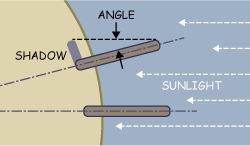
Imagine the poles going down to the center of the earth where they meet. The angle between the poles will be the angle you found with the cast shadow. You now have a “pie slice” of the Earth where you know the distance between the poles along the rim of the “pie” and the angle of the slice at the center of the “pie.” A full circle is 360°, divide the angle into 360. Now you know how many “pie slices” it takes to make the whole “pie.” Then multiply the distance of the “pie slice” edge by the number of “slices.” This will give you the circumference of the “pie.”
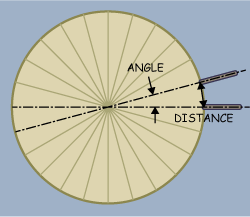
This was how Eratosthenes did it, only he used a tall pole in Alexandria and a water well in Syene, present day Aswan. On the summer solstice light shone directly down the center of the well, meaning it was on the tropic of cancer. This made things easy because he didn’t need a pole in Syene, the angle of the shadow from the pole in Alexandria would give the angle he needed. This was 7.2°, one 50th of the circumference of the Earth.
Eratosthenes figured the distance north-south between Alexandria and Syene as 5,000 stadia, about 575 miles. This would mean the Earth was 250,000 stadia around, roughly 28,740 miles. Unfortunately it’s actually 526 miles between the two sites and the Earth isn’t a perfect sphere. Earth is 24,900 miles in circumference at the equator. Still, a pretty good effort all around. Sorry for the pun.
Filed 9/10/13
P-38 Frozen in Time, But When?

The 3 kilometer thick Antarctic ice sheet is calculated to be 250,000 years old. This is figured by counting ice layers, one layer is a year of winter build-up and summer thaw. However, there’s a fly in the ointment. A really big fly. Maybe the size of a P38.
“The lost squadron” of Lockheed Lightnings were abandoned in Greenland in 1942. Fifty-one years later, a team led by Patrick Epps dug them out from under 250 feet of ice. One might expect he dug through 51 layers. But a quote from Mr. Epps reveals otherwise, “Who told you one layer equals one year? We dug down through fifty years of time and found thousands of layers in 250 feet.”
Seems the one layer per year idea is pretty questionable. Rather than a yearly freeze-melt cycle, it’s more likely a layer is a large storm, a slight thaw at the surface topped by another storm.
Perhaps Mr. Epps exaggerated. Maybe he found hundreds of layers. Say a thousand all told in 51 years of build-up. This would mean about 20 layers per year. This being the case, 250,000 ice layers would not mean 250,000 years, it would mean 12,500 years. Twenty-five layers per year would mean 10,000 years.
In which case they know what was happening on Antarctica 250,000 years ago. With a margin of error of 240,000 years. Or maybe those P38s were really lost by Erik the Red.
Filed 9/5/13
Sun Flunks Test

Modern science tells us with no uncertainty they know how the sun works: It’s a thermonuclear fusion ball. Recently scientists ran an MRI on the sun to map the convection of heat from the nuclear core to the photosphere. Unfortunately, they could only find 1% of the convection needed for the sun to work.
There are a few other problems that defy solar theory: the sun is too round; the equatorial regions rotate faster than the poles; particles streaming from the sun accelerate as they get farther away; it’s hotter on the outside than on the inside; there’s no good explanation for the cycles and the tiny variation of visual light, but huge variations in other wavelength emissions; every prediction of what they’d find at the edge of the heliosphere was wrong.
So, except for lacking 99% of the heat convection required the standard model of the sun is an atom-smashing success. I guess being one percent correct is close enough for settled science.
Filed 8/21/13
Yes, But Are They Pants or Trousers?

Though now-a-days we think of jeans being made of denim, originally jean and denim were not the same thing. Denim derives from serge de Nîmes, a fabric of the city of Nîmes, France. Jeans, on the other hand, comes from the Italian city of Genova. That’s Genoa to English speakers, and Jennes if you parlay Fran-say. The fabric made there was called jean or jeane.
Then we have dungaree, from Hindi dungri which was a coarse calico named after a village in India which is now a section of Bombay.
We don’t much associate blue jeans with France, Italy, or India but rather with America. More specifically with the California gold rush and the work trousers made by Levi Strauss in San Francisco. Other folks made work trousers out of jean, denim and dungaree before Mr. Strauss came along. Strauss’ big innovation was adding rivets for durability. Check out the pockets of the jeans you might have on right now. Rivets.
Levi’s pretty much set the pattern for the modern jeans we all wear today. Though we might not call them Levi’s had Mr. Strauss not changed his name from Löb to Levi. We might go put on a pair of Löb’s. Just doesn’t have the same ring to it, even if you did know how to pronounce it.
Filed 8/8/13
Infrequently Answered Questions
Bureaucracy has Brought Meaning to the Lives of Many Bureaucrats

Q: What would a computer cost if Congress passed an Affordable Computer Act?
A: I don’t know what a computer would cost, but compare the diagrams and make your best guess. And I haven’t even included the bureaucrats to write computer specs. Which would likely mean computers must come with every bit of software the bureaucracy demands they have whether you need it or not. You probably couldn’t design a worse system if you tried. But give the government credit, they keep trying.
If you ever thought government bureaucrats were efficient, here’s a nice anecdote. The USG hired a private firm to do a job bureaucrats had been doing. The job was done by three people in the private sector where the government needed 16.
Filed 8/4/13
Where Wend Went

As you wend your way through the English language you’ll run across many an irregular verb. Some of them very irregular. But we don’t think about it much because they’re usually very common words and we’re used to them. Still, in many cases you can spot how they have the same root. For instance: write, wrote, written. On the other hand, “be” might be the most irregular verb of all: be, am, is, are, was, were, been. Hard to see a linguistic connection there.
None of this is news to you, I’m sure. Just a way to get to go. That is: go, goes, gone, went. One can easily see the connection among the first three which all start with g-o. Then we come to went. Huh? Where’d that come from? That’s what I’m here to answer.
Old English speakers had two words for go. Go, of course, and wend. We still use go all the time, but wend turns up rarely. And usually with a way added. Just like in the first sentence of this bit, “As you wend your way through the English language…”
Back in the day the past tense of “go” was “gaed”. The past tense of “wend” was “went”. Some time around the 15th century “go” became the preferred verb, except in the past tense where “went” replaced “gaed”, leaving us with the cross-bred irregular verb we use today.
Now-a-days wend is used to mean wander more than simply go. Plus, the past tense of wend isn’t went any more. On the rare times it’s used, people now employ wended. But they invariably add the way. As in, “I wended my way through the article and I decided I’d had enough.” I guess that means it’s time to wend.
Filed 7/18/13
Christmas in July

Happy Independence Day, the secular high holy day of America. Like Christmas, it marks a birth. Like Christmas, it has a mascot.
Santa Claus or Uncle Sam?
- Avuncular white guy with white hair and whiskers
- Colorful, but dated costume designed by cartoonists
- Can be identified by his hat alone
- Childless and ageless
- Keeping a list of who’s naughty or nice
- Likes giving stuff away (which other people actually pay for)
- Vast army of little folk working for him
- Isn’t welcome in Iran
- Only the gullible believe in him
Filed 7/4/13
Working But Pointless Inventions

How often have you been doing some chore and think, “There’s got to be a better way”? You’re not alone. Gadgets and gizmos are everywhere for doing all sorts of things. Gadget freaks love them, others find them of dubious value. Some work well, others are what you might call a bad improvement. Then there’s the Japanese chindogu, the unuseless idea.
Chindogu
Unuseless Japanese Inventions
Chindogu is an invention that works, more-or-less, but which there really isn’t any practical need for. Like cat mittens that are little dust mops so the cat cleans the floor as it walks around. Or a big curved hairbrush so you can comb your hair in one stroke. Then there’s an apron with hooks so you can wear all your kitchen tools. Very handy. Or is it?
These inventions aren’t quite Rube Goldbergian, they are not needlessly complex, they’re just plain needless. Chindogu, inventions without necessity. If necessity is the mother of invention, these inventions are motherless. Which makes me wonder what the father of invention is and whether that can explain any of this nonsense.
Filed 4/22/13
Things to Come

We like to think technology will keep improving. Modernity will get moderner. Things will get better, cheaper, faster. But in some cases we’ve already reached the practical limit.
Take speed of communication. With cell phones, satellites and whatnot we can talk to someone on the other side of the globe almost instantaneously. Can’t see how it could get any faster than that.
Take speed of travel. Air travel maxed out with the jet. Jet travel is actually slower today than it was 40 years ago. For one thing, the SST has been retired. Also, jet airliners fly slower today than in the 60s to save fuel. We build cars that go 100 mph, but but we don’t commute that fast, do we?
For reasons other than technology things in the future might be different than imagined.
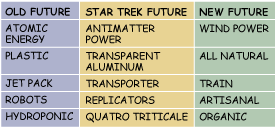
The old future looks less popular than before. The Star Trek future looks less likely than ever. The new future looks a lot like the 19th century. The future ain’t what it used to be.
Filed 4/13/13
Talking Horse Sense
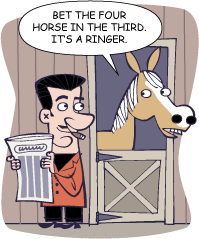
Most folks don’t deal with horses all that much these days. Still, many sayings related to horses remain in the language. Hold your horses, the cart before the horse, horse of a different color, you can lead a horse to water but can’t make it drink. These make intuitive sense even now. Then there’s some that are, well, weird. See a man about a horse.
I want to explore a few old horse sayings. Two weird ones, and two that might not seem to be about horses but are.
Don’t look a gift horse in the mouth
Straight from the horse’s mouth
Long in the tooth
Dead ringer
So we might ask, how does long in the tooth mean old. As we’re on horse sayings, you might guess older horses have longer teeth. Or rather their teeth look longer. What actually happens is their gums recede with age exposing more of the tooth. Hence, long in the tooth.
If you’ve put two and two together you might now imagine why someone would look a horse in the mouth. To tell how old it is. Looking a gift horse in the mouth is akin to asking what a gift cost. Kind-of rude. In any event, beggars can’t be choosers. Or maybe, since we’re talking about teeth, don’t bite the hand that feeds you.
Dead ringer goes back to American horse racing at the end of the 19th century. A ringer was a horse raced under the name of a look-alike horse to cheat the betting odds. Dead in this case means exact. As in dead center, dead on, dead even. So a dead ringer is an exact or extremely close look-alike.
Straight from the horse’s mouth also comes from racing. Bettors love inside tips on races. What source is more inside than the horse itself? Straight from the horse’s mouth is a joking way to say you have inside information without revealing the actual source. “A little birdie told me, nod, nod, wink, wink.” And a nod is as good as a wink to a blind horse.
With all this talk about horses and mouths, we finish up with a talking horse, Mr. Ed. Did you know Mr. Ed had a stand-in stable mate? A look-alike named Pumpkin. Yep, a dead ringer for Mr. Ed.
Filed 4/6/13
Infrequently Answered Questions
Do Elephants Never Forget Mice?

Q: Are elephants really afraid of mice?
A: There’s plenty of animal folklore out there. Like cats always land on their feet, bulls are provoked by the color red, and elephants never forget. Another bit of elephant lore there. I have no personal experience with bulls or elephants, but I know first-hand cats have an uncanny ability to twist themselves in mid-air and land on their feet. But I seem to have drifted off the point.
On the face of it, it seems absurd that an elephant would be afraid of a mouse. What could a mouse possibly do to an elephant? It’s like a cat being afraid of a fly or something. Pretty ridiculous. How do such tales ever gain traction? I can’t explain it.
Well, the Mythbusters tested this old bit of folklore and if their video is right, elephants ARE afraid of mice. Or at least they shy away from mice. Hard to believe, but there it is in living color. I can’t explain this either. All the same, I’ll never forget it. Whether the elephants in the video will forget or not, I simply don’t know.
Mythbusters, Elephant and Mouse
Filed 3/20/13
Bad-ass Brass Kills Germs

Are you a germophobe? Here’s a little tip that may help you: get brass doorknobs. That’s because researchers have found that copper and copper alloys like brass can kill germs and prevent antibiotic resistance in bacteria from spreading.
Plastic and stainless steel surfaces allow bacteria to survive and spread when people touch them. Even if the bacteria die, DNA that gives them resistance to antibiotics can survive and be passed on to other bacteria. On the other hand, copper and brass kills the bacteria and also destroys this DNA.
To quote Professor Bill Keevil of Southampton University in the UK, “There are a lot of bugs on our hands that we are spreading around by touching surfaces… On stainless steel surfaces these bacteria can survive for weeks, but on copper surfaces they die within minutes.” Source.
Nowadays when we think clean and sanitary we think of stainless steel. It’s all over our kitchens and hospitals. But we may have rather missed the boat, sanitary-wise. Brass and copper would be better.
Filed 3/16/13
Joss Paper –Money to Burn

What’s the difference between fiat money, counterfeit money, Monopoly money, and Joss paper? Well, I’m assuming you know what the first three are. But what is Joss paper, you might ask. In some cultures people send money to dead relatives in the afterworld, not by Western Union but by burning it. They cremate the money, as it were. How they direct who in the afterlife gets this money, I couldn’t say.
As you can imagine burning money has a big drawback. Which is, of course, you’re burning money. So folks came up with a workaround, they burn fake money, money that looks similar to real money but isn’t. This is called Joss paper. This way a person can buy a million dollars worth of money to send to the afterworld for about ten dollars. This solves the drawback mentioned earlier.
Apparently dead people can’t tell real money from fake money. Or at least living people think so or they wouldn’t be burning Joss paper. Though come to think of it, once it’s burned up to ashes it’s hard to tell real money from fake money in the here and now. Maybe that explains it.
You might know the US Treasury replaces old worn-out, beat-up, grungy dollars with crisp new dollars. When they do, they burn the old bills. One wonders who gets all that money. Does it go to an afterworld central bank? Maybe Yoram Bauman knows. He knows all about…
Filed 2/27/13
The Pareto Principle

Ever hear of the 80/20 rule? This basically applies to statistics like this: 20% of the beer drinkers drink 80% of the beer. I made that up, but it sounds plausible, doesn’t it? Maybe this jibes with your own experience. You might know lots of folks who drink a few beers now and then, but a few people who drink lots of beer all the time. The whole 80/20 thing just seems right.
Thing is, there’s some truth in the 80/20 rule. The rule came about because that distribution, or something close to it, happens to be true for many things. Economist Vilfredo Pareto (1848-1923) discovered that 80% of the land in Italy was owned by 20% of the population. Further research in other areas turned up a large number of other natural and social examples of a similar distribution.
This led to what is called the Pareto principle, the Pareto distribution, or simply the 80/20 rule. The Pareto distribution isn’t a law of precise prediction, it’s a power law probability distribution projecting probabilities and ranges, not exact numbers. For example: the top 25% of U.S. wage earners pay 87% of the Federal income taxes. Sort-of 80/20, though not exactly.
The next time you hear such a statistic at a cocktail party you might figure it was made up. But even so, might still be close to the truth. Whatever the case, you can challenge it or just let it slide. After all, at any cocktail party 20% of the people speak 80% of the nonsense.
Filed 2/19/13
Here There Ain’t no Repetitious Redundancies Repeated Here

Extra Additional Word Text
- pooled together
- merged together
- grouped together
- unfilled vacancy
- absolutely necessary
- freezing cold
- pair of twins
- future plans
- surrounded on all sides
Numbers one through three are all kind-of the same and so could be pooled, merged, or grouped togeth… I won’t say it.
Necessary is absolute in and of itself. It’s like being dead or alive. You can’t be sort-of dead where absolutely dead is different than just plain dead. On the other hand there is the idiomatic expression of being half dead. But that’s not absolutely necessarily to be taken literally.
Any plan is for the future, you can’t plan the past. And you can’t plan the present because then it’s not a plan it’s what’s happening. According to plan or not. Then again, if you plan to make plans maybe that would be future plans.
Filed 2/1/13
I Hate “Gifting”

Often folks wish certain words and buzz-phrases would just go away and die, already. To that end, the Unicorn Hunters of Lake Superior State University nominate words and phrases that should be banished from the English language. This sentiment crops up for a few reasons: people are sick to death of hearing it, the word or phrase has grown stale, a cliché; people use them in the wrong place, or at the wrong time, or to mean the wrong thing; the word or phrase was stupid, wrong, misleading, inaccurate from the gitgo.
Take the word gifted. Please. Not gifted meaning blessed with talent, but gifted meaning the past tense of gift. As in, “My aunt gifted this jewelry to me.” I hear this usage on Antiques Roadshow a lot. But gift isn’t a noun to have a past tense. She gave a gift. A gift was given. A gift was gifted? Was the gift somehow blessed with talent?
Perhaps the Unicorn Hunters are stalking this one as I write. If not, I gift it to them forthwith.
Filed 1/12/13
How to Boost GDP Without Really Trying

To bolster the slow economy the staff at TerryColon.com have forwarded our complete plan to Congress, the Full Employment Act of 2013. This comprehensive well-laid-out bill promises to end unemployment permanently, jumpstart the economy and raise needed tax revenue. The genius of the bill is it simply reclassifies anyone without a paying job as self-self-employed.
As our chief executive acting editor pro tem, John Kainz explained, “Just because you don’t have a job doesn’t mean you aren’t working. Chores are work, right? You simply pay yourself for this work. This keeps the money in the family which is good for the personal economy. To increase income homeowners could simply dig holes, fill them in, then pay themselves for both.”
While this aspect of the bill alone would drive unemployment to zero, there are added extras. First is the maximum wage provision which would require all self-self-employed persons to pay themselves prevailing wages for jobs done around the house. Combined with the Grecian formula of paying yourself 14 monthly checks a year the self-self-employed can bootstrap themselves to higher income in no time at all.
As the formerly unemployed are now gainfully self-self-employed, the tax stimulus multiplier kicks in as these wages will be subject to income taxes and the hefty 3/4 FICA payments familiar to the self-employed. The estimated added taxable income from dish washing and laundry alone will close budget shortfalls and keep America spic-and-span to boot.
These self-payments will greatly increase GDP by adding an entirely new category to the equation, a combined consumption-investment called onantion. (C+I+G+O=GDP) This addition promises to grow the economy out of the recession into unprecedented boom times overnight turning Gross Domestic Product into Grosser Domestic Product. Full employment, higher income, deficit reduction, and increased GDP at a single stroke. It’s a win-win-win-win.
You can thank us later.
Filed 1/8/13
Hazardous New Year!

Some people celebrate New Year’s Eve in strange, and dangerous ways. For instance, many folks like to shoot guns in the air. OK, they shoot the bullets in the air with guns. This is actually less dangerous than many worry-warts suppose. Provided merry-makers shoot straight up. Bullets go up from the explosive force of gunpowder. But they come down from gravity, and due to air resistance reach terminal velocity. Which is not nearly as fast as going up, and not nearly as lethal.
However the French have their our peculiar way of celebrating. They burn cars. This past New Year’s Eve 1,193 vehicles were burned in France in matter of a few hours. Then again, burning cars is something of a national pastime over there. On average about 110 cars go up in flames daily. It is a tradition no-one can explain.
Of course, there’s a lot of things French no-one can explain. Like French cars, for instance.
Filed 1/5/13
The Ministry of “Quotations”

According to unnamed reliable sources the European Union will soon announce the formation of the Ministry of “Quotations” to oversee media citations of all EU announcements and denials of previous announcements. In future, all media citations must fit within strictly defined classifications: unnamed, well-placed, unnamed well-placed, un-quoted, official, unofficial, official unnamed, official un-quoted, official well-placed, reliable, unnamed reliable, well-placed reliable, official unnamed well-placed, and unofficial un-quoted unnamed well-placed reliable.
The Ministry of “Quotations” has set up a website to help the media and the reading public understand what the new classifications mean. A well-placed reliable source said the site will be user-friendly, featuring a cute feline mascot named Miss Information to lead readers through the many details.
An unnamed well-placed source didn’t clarify whether when spoken the new entity should be said as “Ministry of quote Quotations unquote” or simply stated as “Ministry of Quotations” with air quotes given at the appropriate moment. A second well-placed reliable source claimed air quotes should not be used so as not to offend the satirically challenged. When contacted, a third unofficial un-quoted unnamed well-placed reliable source denied everything.
Filed 1/2/13